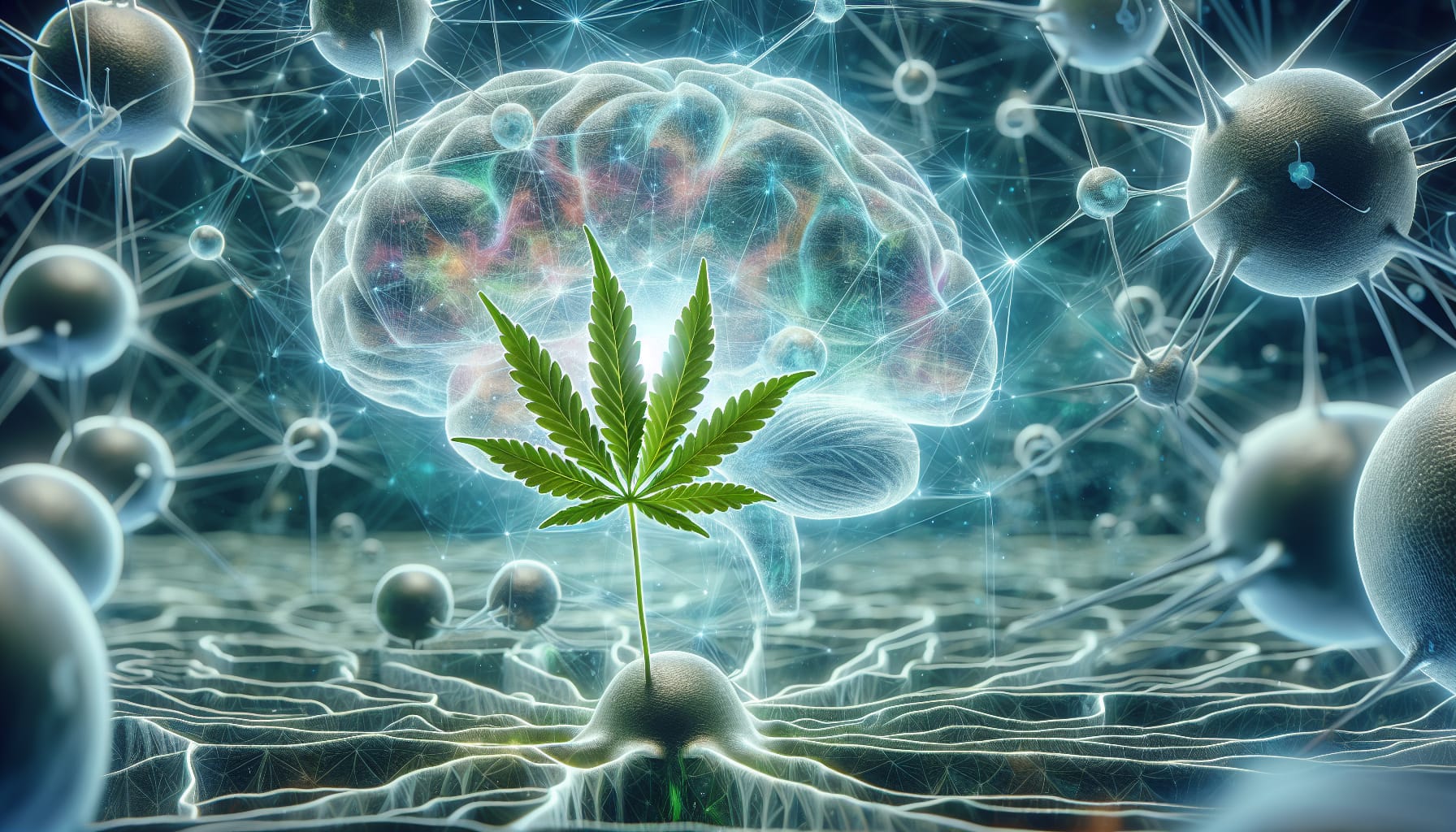Have you ever wondered if there is any evidence to back up the claim that CBD has neuroprotective effects? In recent years, CBD has gained popularity for its potential health benefits, particularly in the realm of brain health. But is there any concrete evidence to support CBD’s neuroprotective properties? In this article, we will explore the research and scientific studies that have been conducted to shed light on this intriguing topic. By examining the available evidence, we hope to provide you with a clearer understanding of whether CBD truly holds promise as a neuroprotective agent.
What is CBD?
CBD, or cannabidiol, is a natural compound derived from the cannabis plant. It is one of over 100 cannabinoids found in cannabis, but unlike its well-known cousin THC (tetrahydrocannabinol), it does not produce psychoactive effects. Instead, CBD has gained popularity for its potential therapeutic benefits, particularly its neuroprotective effects.
Definition of CBD
CBD is a non-intoxicating cannabinoid that interacts with the body’s endocannabinoid system (ECS). The ECS is responsible for maintaining balance and homeostasis in the body, and CBD acts on cannabinoid receptors to modulate various physiological processes. CBD is available in various forms, including oils, capsules, topical creams, and even edibles.
Brief history of CBD
The use of cannabis for medicinal purposes dates back thousands of years, but it wasn’t until the 20th century that scientists began to isolate and study its individual compounds. CBD was first discovered in the 1940s and its structure was elucidated in the 1960s. However, it wasn’t until the early 2000s that researchers started to uncover its potential neuroprotective effects.
Legality of CBD
The legal status of CBD varies from country to country and even within different states or provinces. In some places, CBD derived from hemp (cannabis with less than 0.3% THC) is legal, while CBD derived from marijuana (cannabis with higher levels of THC) may be subject to more restrictions. It is important to consult local laws and regulations regarding the legality of CBD before purchasing or using it.
Neuroprotective Effects of CBD
Overview of neuroprotective effects
Neuroprotective effects refer to the ability of a substance to protect the brain and nervous system from damage or degeneration. CBD has shown potential neuroprotective properties through its interaction with the ECS and various other mechanisms. It has been studied in relation to neurodegenerative disorders, such as Alzheimer’s and Parkinson’s disease, as well as epilepsy and other neurological conditions.
Exploring CBD’s potential for neuroprotection
Research on CBD’s neuroprotective effects is still in its early stages, but preliminary evidence suggests that it may have a positive impact on neuronal health. CBD has been found to reduce oxidative stress, inflammation, and excitotoxicity, all of which play a role in neurodegenerative diseases. Furthermore, it has been shown to promote neurogenesis, the growth and development of new neurons, in certain brain regions.
Studies on animal models
Many of the studies investigating CBD’s neuroprotective effects have been conducted using animal models, such as mice or rats. These studies have provided valuable insights into the potential mechanisms of action and effectiveness of CBD. For example, in a study published in the Journal of Alzheimer’s Disease, CBD was found to reduce cognitive decline and improve memory in an Alzheimer’s disease mouse model.
CBD and Neurological Disorders
CBD’s impact on Alzheimer’s disease
Alzheimer’s disease is a neurodegenerative disorder characterized by cognitive decline and memory impairment. Studies have shown that CBD may have a positive impact on Alzheimer’s patients by reducing inflammation, oxidative stress, and the accumulation of amyloid-beta plaques, which are hallmarks of the disease. Additionally, CBD has been found to promote neurogenesis and improve spatial memory in animal models of Alzheimer’s.
CBD’s effect on Parkinson’s disease
Parkinson’s disease is a progressive neurological disorder that primarily affects movement. Research suggests that CBD may have potential therapeutic benefits for Parkinson’s patients. It has been found to protect neurons from damage, reduce inflammation, and improve motor function in both animal models and small-scale clinical trials. CBD’s interaction with the ECS and its anti-inflammatory properties have been suggested as possible mechanisms for these effects.
CBD and epilepsy
Epilepsy is a neurological disorder characterized by recurrent seizures. CBD has been of particular interest in the treatment of epilepsy, specifically certain forms of treatment-resistant epilepsy, such as Dravet syndrome and Lennox-Gastaut syndrome. In fact, the U.S. Food and Drug Administration (FDA) has approved a CBD-based medication called Epidiolex for the treatment of these rare forms of epilepsy. CBD’s anticonvulsant properties are thought to be responsible for its effectiveness in reducing seizure frequency and severity.
Mechanisms of CBD’s Neuroprotective Effects
Interaction with the endocannabinoid system
CBD interacts with the body’s endocannabinoid system, which plays a crucial role in maintaining balance and homeostasis. The ECS consists of cannabinoid receptors, endogenous cannabinoids (endocannabinoids), and enzymes involved in their synthesis and degradation. CBD has been found to modulate the activity of cannabinoid receptors, particularly CB1 and CB2 receptors, which are abundant in the brain and other tissues implicated in neurological disorders.
Anti-inflammatory properties of CBD
Chronic neuroinflammation is a common feature of many neurodegenerative diseases. CBD has been shown to have potent anti-inflammatory effects by inhibiting the release of pro-inflammatory cytokines and reducing the activation of immune cells. By reducing inflammation in the brain, CBD may help protect neurons and promote overall neurological health.
Antioxidant effects of CBD
Oxidative stress, which occurs when there is an imbalance between the production of reactive oxygen species (ROS) and the body’s antioxidant defenses, is implicated in the pathogenesis of many neurological disorders. CBD has been found to have antioxidant properties, meaning it can neutralize ROS and protect cells from oxidative damage. By reducing oxidative stress, CBD may help prevent or slow down the progression of neurodegenerative diseases.
Clinical Trials and Human Studies
Overview of clinical trials
While the majority of research on CBD’s neuroprotective effects has been conducted in animal models, there is also a growing body of evidence from clinical trials involving human participants. These trials aim to evaluate the safety, tolerability, and efficacy of CBD for various neurological disorders. They often involve small sample sizes, but their findings provide valuable insights into the potential therapeutic benefits of CBD.
Positive outcomes in human studies
Several clinical trials have reported positive outcomes regarding CBD’s neuroprotective effects. For example, a study published in the New England Journal of Medicine found that CBD significantly reduced the frequency of seizures in patients with Dravet syndrome. Another study published in the Journal of Psychopharmacology showed that CBD improved sleep quality and quality of life in patients with Parkinson’s disease. These findings suggest that CBD holds promise as a potential treatment for neurological disorders.
Challenges and limitations of human studies
While clinical trials provide valuable information about the potential therapeutic benefits of CBD, they are not without challenges and limitations. One major challenge is the difficulty in conducting large-scale trials due to legal restrictions and limited funding. Additionally, studies may vary in terms of CBD dosage, administration route, and study design, making it challenging to compare results across different trials. Furthermore, individual responses to CBD may vary, highlighting the importance of personalized medicine in the context of CBD-based therapies.
Safety and Side Effects of CBD
General safety profile of CBD
CBD is generally considered to be safe and well-tolerated, with a low risk of adverse effects. The World Health Organization (WHO) has stated that CBD exhibits no effects indicative of abuse or dependence potential. However, it is worth noting that individual sensitivity and tolerance to CBD may vary, and some people may experience side effects or drug interactions.
Potential side effects of CBD
While CBD is generally well-tolerated, some individuals may experience side effects. These may include drowsiness, dry mouth, dizziness, and changes in appetite or weight. It is important to start with a low dose of CBD and gradually increase it to find the optimal dosage that provides therapeutic benefits without causing unwanted side effects. Additionally, it is recommended to consult with a healthcare professional before using CBD, especially if you are taking other medications.
Interactions with other medications
CBD has the potential to interact with certain medications, particularly those metabolized by the liver’s cytochrome P450 enzymes. CBD can inhibit these enzymes, leading to reduced metabolism and increased concentrations of the medication in the bloodstream. This can potentially result in unwanted side effects or altered drug efficacy. Therefore, it is important to talk to your doctor or pharmacist about potential drug interactions before using CBD alongside other medications.
Comparison to Other Neuroprotective Agents
CBD vs. THC as neuroprotectants
CBD and THC are the two major cannabinoids found in cannabis, and they have distinct effects on the body. While THC is known for its psychoactive properties, CBD does not produce a “high.” In terms of neuroprotective effects, both cannabinoids have shown promise, but CBD is generally considered to be better tolerated and has a lower risk of adverse side effects. CBD’s non-intoxicating nature makes it an attractive option for those seeking neuroprotective benefits without the psychoactive effects associated with THC.
CBD compared to traditional medications
In comparison to traditional medications used to treat neurological disorders, CBD offers a potentially more natural and holistic approach. Many traditional medications come with a range of side effects and may not address the root cause of the condition. CBD, on the other hand, interacts with the body’s own endocannabinoid system and can modulate various physiological processes. Furthermore, CBD has shown potential in treating conditions that are often resistant to traditional medications, such as certain forms of epilepsy.
Synergistic effects of CBD with other compounds
CBD may exhibit synergistic effects when combined with other compounds found in cannabis, such as other cannabinoids, terpenes, and flavonoids. This phenomenon, known as the entourage effect, suggests that the therapeutic potential of cannabis is greater when its compounds work together rather than in isolation. Further research is needed to fully understand how CBD interacts with other compounds and to determine the optimal combinations for specific neurological disorders.
Potential Applications and Future Research
Potential therapeutic applications of CBD’s neuroprotective effects
The neuroprotective effects of CBD have the potential to be applied to a wide range of neurological disorders. From Alzheimer’s disease and Parkinson’s disease to epilepsy and traumatic brain injury, CBD’s ability to modulate the ECS, reduce inflammation, and protect against oxidative stress makes it a promising candidate for neuroprotection. Additionally, CBD’s safety profile and tolerability make it an attractive option for long-term use in chronic disorders.
Areas for further research and investigation
While research on CBD’s neuroprotective effects is growing, there are still many unanswered questions. Further investigation is needed to understand the optimal dosage, administration route, and treatment duration for different neurological disorders. Additionally, more research is needed to explore the potential long-term effects of CBD use and the impact of CBD on specific populations, such as children or older adults.
The future of CBD as a neuroprotective agent
As our understanding of CBD’s neuroprotective effects continues to grow, so does its potential as a therapeutic agent. With ongoing research and clinical trials, we can expect to see a better understanding of CBD’s mechanisms of action and its effectiveness in different neurological disorders. The future may hold even more targeted and personalized treatments harnessing the neuroprotective potential of CBD.
Conclusion
CBD has emerged as a promising natural compound with potential neuroprotective effects. Through its interaction with the endocannabinoid system, anti-inflammatory properties, and antioxidant effects, CBD has shown promise in protecting the brain and nervous system from damage and degeneration. Clinical trials and human studies have provided valuable insights into its potential therapeutic benefits, although challenges and limitations remain. CBD’s safety profile and potential synergistic effects with other compounds make it an exciting area of research for the future. As we continue to uncover more evidence supporting CBD’s neuroprotective effects, it is important to further explore its potential applications and continue the quest for more effective treatments for neurological disorders.
References
- Gloss, D., & Vickrey, B. (2012). Cannabinoids for epilepsy. Cochrane Database of Systematic Reviews, 6(6).
- Iffland, K., & Grotenhermen, F. (2017). An update on safety and side effects of cannabidiol: A review of clinical data and relevant animal studies. Cannabis and Cannabinoid Research, 2(1), 139-154.
- Pazos, M. R., Mohammed, N., Lafuente, H., Santos, M., Martínez-Pinilla, E., & Moreno, E. (2013). Mechanisms of cannabidiol neuroprotection in hypoxic-ischemic newborn pigs: Role of 5HT1A and CB2 receptors. Neuropharmacology, 71, 282-291.
- Scuderi, C., Steardo, L., Esposito, G. (2007) Cannabidiol promotes amyloid precursor protein ubiquitination and reduction of beta amyloid expression in SHSY5YAPP+ cells through PPARgamma involvement. Phytother Res. 21(6):554-60.
- Valdeolivas, S., Navarrete, C., Cantarero, I., Bellido, M. L., Muñoz, E., & Sagredo, O. (2015). Neuroprotective properties of cannabigerol in Huntington’s disease: Studies in R6/2 mice and 3-nitropropionate-lesioned mice. Neurotherapeutics, 12(1), 185-199.





